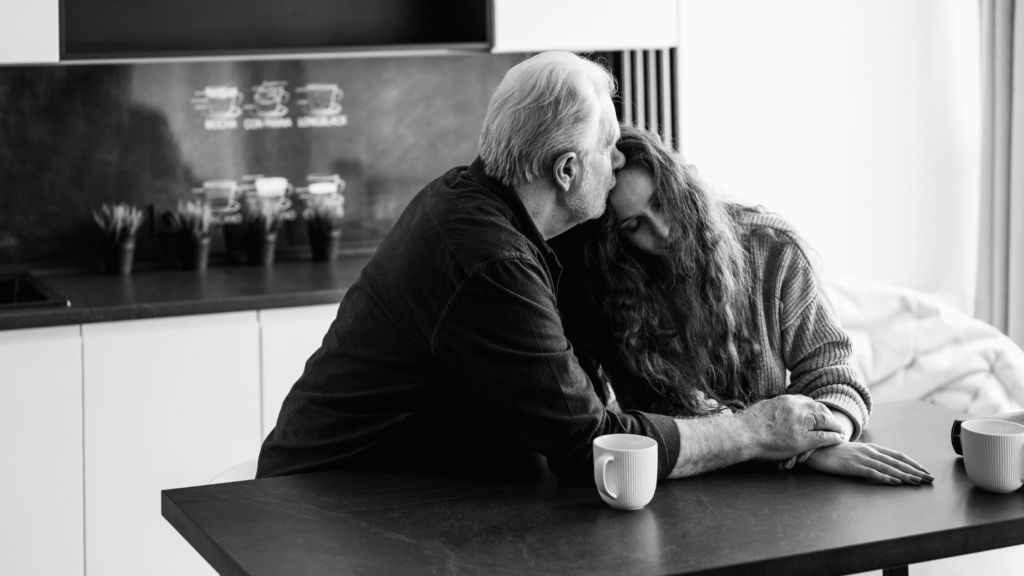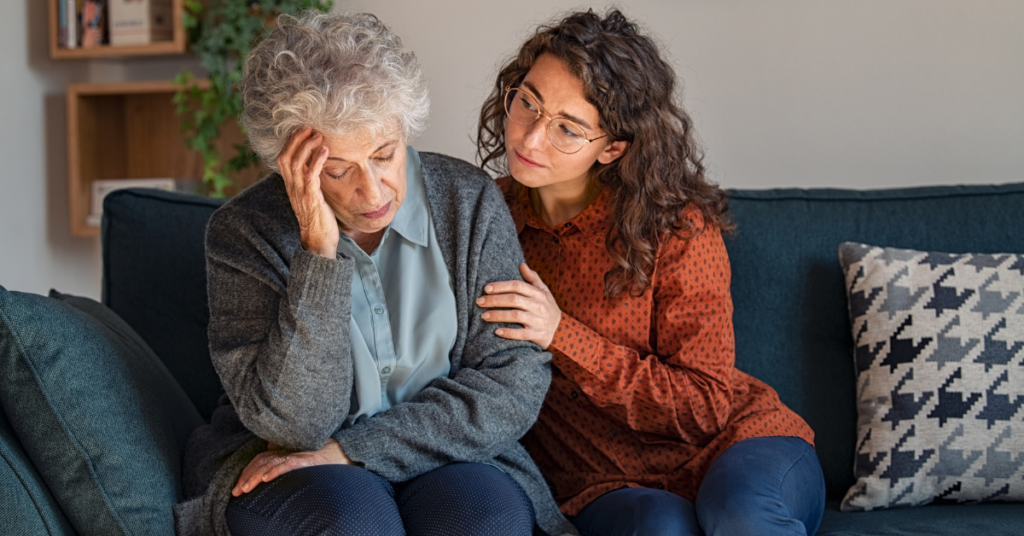© 2024 Abode Hospice of New Mexico
All Rights Reserved
All Rights Reserved
Even when you know someone is dying, watching a loved one take their last breath is surreal.
If they are on life support, once they are removed from it, their breathing may change pretty quickly, and then it stops. Natural death can be different. For several minutes, you watch their breathing change. It becomes shallower, intermittent, until with great finality, they take their very last breath. Then, nothing but silence.

The emptiness of that moment feels like it would suck you into it if it could. You cry, with a depth of pain that feels like it is tearing right through you. You want to get away form the pain, but there is nowhere to run to. Part of their legacy is tied to you, sewn into the very fabric of your life. In losing others, one can feel like they have lost part of themselves.
Maybe that is why anxiety and feeling unsettled is so common after losing a loved one.
In the acute phase of grief, there is physical and neurological consequence. One’s heart can actually change. Takotsubo cardiomyopathy (AKA broken heart syndrome) causes the heart’s main blood-pumping chamber (the left ventricle) to change shape and get larger. This weakens the heart muscle, and it doesn’t pump blood as well as it should. The symptoms usually last a few weeks, and one’s heart can return to normal function.
The word ‘takotsubo’ comes from the name of a pot used by Japanese fishermen to trap octopuses. When the left ventricle of the heart changes shape, it develops a narrow neck and a round bottom, making it look somewhat like an octopus trap.
Then, there is the brain’s response to grief and loss. One can experience changes in memory, behavior, and sleep. Cognitive effects can also happen. One common one is known as brain fog. These neurological changes are a protective mechanism in order to help us survive.
Perhaps that protective mechanism helps younger folks survive, but the risk in elderly survivors can also increase. The depression, anxiety, and physical changes reduce one’s motivation to get up and move Non-adherence to one’s medical regimen can be compromised, increasing hospitalization risk.

I’m not sure the last breath is an event one can prepare for. The emotional toll can last months or years.
Which is why our hospice bereavement is so important. We provide bereavement support for over a year to those who must move forward but feel like they can’t. Children – both young and old – and other family receive care while the world moves on around them.

We all grieve differently, but one thing remains true for everyone: the importance of taking care of yourself. Whether you’ve found yourself in a state of just going through the motions or you’ve put all your focus on taking care of your loved ones, it can be easy to put your own needs on the back burner when facing the loss of a loved one.
However, it’s absolutely imperative that you take time to focus on yourself, too. In honor of Mental Health Awareness Month, we are discussing the importance of self-care throughout the grieving process.
Mental Health Awareness Month dates all the way back to 1949 when the National Association for Mental Health (now known as Mental Health America) first organized the observance in the month of May to help raise awareness and lessen the stigma attached to mental illness.
For a long time, society looked at mental illness as being just one thing. There was always a negative stigma attached to the term, and people often thought of those living with a mental illness as having ‘gone mad’. However, that is simply not true. Over time, we’ve learned more about the many layers and types of mental illness.
Mental illness is the term used to describe mental health conditions that impact a person’s mood, thinking, and behavior. Common mental illnesses include:
Losing a loved one can be a traumatic experience. You may feel as though you lost a part of yourself and that your life will never be the same. While there is some truth to this, it’s important to remember that you are still here and must go on living your life.
“We don’t move on from grief. We move forward with it.”
– Nora McInerny
Feelings of sadness, anger, loneliness, and hopelessness are all common throughout the grieving process. However, these feelings can sometimes develop into chronic grief which can in turn become a mental illness. In some cases, grief can lead to depression.
Symptoms of chronic grief can include:
Self-care used to be thought of as bubble baths and pampering yourself, but there is much more to self-care. Just like the grieving process, self-care can look different for everyone. But the overall concept is to take care of yourself physically, mentally, and emotionally.
To take care of yourself physically is pretty simple: eat a well-balanced diet, drink plenty of water, exercise regularly, and practice healthy hygiene habits. However, taking care of yourself mentally is a little less cut and dry. This is where it really differs from person to person. To take care of yourself mentally and emotionally, you need to take time to do the things that make you feel good and happy. Hobbies are a good place to start when focusing on taking care of yourself mentally. Maybe you enjoy sitting outside and reading a good book, maybe you are an artist, maybe you enjoy taking long walks with your dog. Whatever it is that leaves you feeling happy and fulfilled, do it!
Research shows the more you practice self-care, the more confident, creative, and productive you are. This also leads to experiencing more joy, making better decisions, building stronger relationships, and communicating more effectively. Overall, you will be in a better frame of mind, making you a better version of yourself. This is not only good for you, but it’s also good for those who depend on you.
When you take time to take care of your whole self (physically, mentally, and emotionally), it will help you to process your feelings of grief in a healthier way.
Always remember that you do not have to face the journey of grief alone. Lean on friends and family to help you through. Don’t be afraid to talk about your feelings. Sometimes we feel the need to be strong for those around us. If this is the case and you would feel more comfortable talking to someone outside the family, lean on the support of your hospice bereavement team. Our kind, compassionate bereavement coordinators are always available to talk or just listen. Never hesitate to reach out.
If you or someone you love is struggling with their feelings of grief and would like to talk to one of our bereavement coordinators, please don’t hesitate to reach out to one of our hospice providers.

By Jacquelyn Buffo, MS, LPC, CAADC
Losing a loved one to a terminal illness is one of the most painful experiences you can go through. The loss of a spouse or partner is traumatic for many people, and the grief journey can feel overwhelming, confusing, and painful. However, each person grieves and works through the grieving process at their own pace and in their own way. If you are grieving the loss of a partner or spouse, you are not alone. The month of April is Bereaved Spouses Awareness Month, observed since 2008. Bereaved Spouses Awareness Month provides support and resources for bereaved spouses.
The difficulty of losing a spouse is followed by a grieving process that can be challenging for many people. Grief is a process and includes many different types of symptoms, some more severe than others. Feelings such as shock, sadness, numbness, and even guilt can occur after losing a spouse. Your experiences of grief may be different than others, and it is dependent upon factors specific to you. Grief can present as intense emotions and can also present in behaviors.
For example, bereaved spouses may experience:
There is no right or wrong way to grieve, and support and help are available to you. An available resource along your journey of bereavement is hospice care. Hospice can help spouses prepare for the impending loss of a loved one. The hospice’s bereavement team can also help spouses after a patient passes. The mission of hospice care is to deliver compassionate, quality care to individuals with terminal illnesses and support the families through the caregiving phase and bereavement process.
Many spouses spend a significant amount of time and energy caring for and tending to their ill partners. But unfortunately, they may overlook their own needs and feelings during this time. Utilizing the hospice team as a source of support can help spouses tend to their emotions and needs when it is difficult.
If you are struggling with the loss of a loved one, it is vital to get the help and support you need. First, talk to a trusted family member or friend about what you’re going through. Loved ones can be strong sources of validation, support, and compassion. You can also talk to your doctor if you notice a change in behavior and mood or if you are having difficulty performing the normal activities of daily living, such as showering regularly and eating. Your doctor may be able to provide you with medication and can also provide you with referrals to a grief counselor or support group near you.
Sources:

The holiday season is here, and what is a time of joy and togetherness for most can be a time full of sadness and grief for others. The holidays are meant to be spent with those we love, so how can you be expected to feel like celebrating when someone you love is no longer there to celebrate with you?
If you are missing a loved one this holiday season, here are some tips to help you take a step back from the grief and survive the holidays.
Let’s be honest, they are everywhere during the holidays. Preparing for these triggers and having a plan for coping with them can sometimes make the triggers more manageable as you encounter them.
Plan to get some space from the holiday chaos if you need it. Being surrounded by family and friends is great, but all at once can be emotionally overwhelming and hard to overcome. Don’t feel guilty about your grief. It is important to be conscious of your limits and take some time to recollect yourself.
The holidays are a time to gather together, eat good food, and share what we’re thankful for. If you’ve recently lost a loved one, it can be hard to feel thankful when you are grieving. Although you may be focusing on the loss, try to remember the good things that relationship brought into your life. Search for that gratitude.
Acknowledge that things will be different this year. Some holiday traditions will remind you of your lost loved one, but it is okay to limit which of these you allow yourself to remember or not. Take time to prepare for which traditions will make you happy and which will overwhelm you.
Although you may normally be the one to host during the holidays, this year may be too much to take on alone after losing your loved one. Accept help when it’s offered. Remember that there is no shame in saying yes. Those who love you want to help.
The holidays can be hard for those who have recently lost a loved one. Grief can be especially unavoidable during these times, but it is important to remember that you can still feel joy through the grief. Taking these tips into account can help you prepare for that grief and make your holidays more enjoyable.